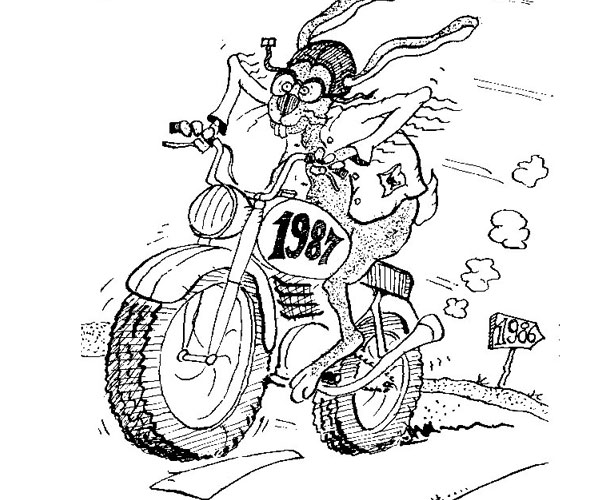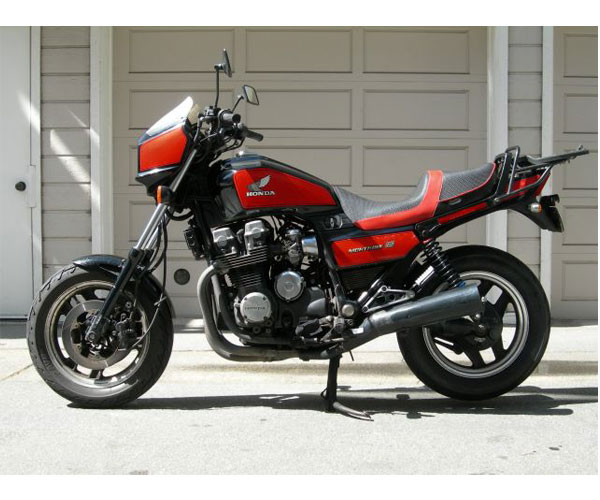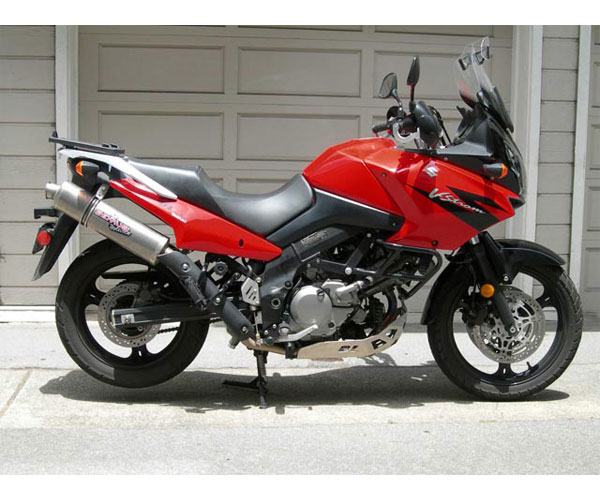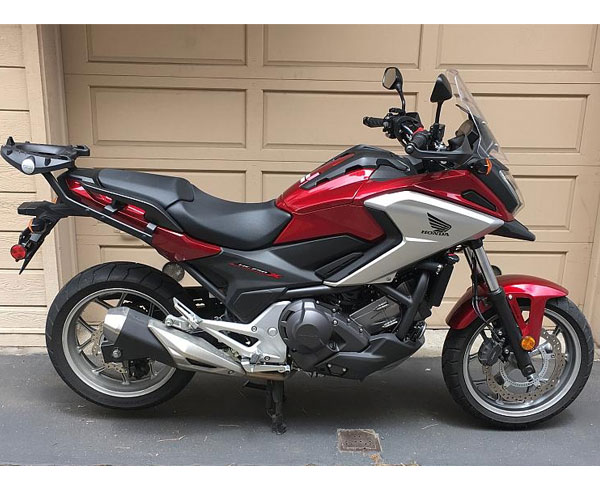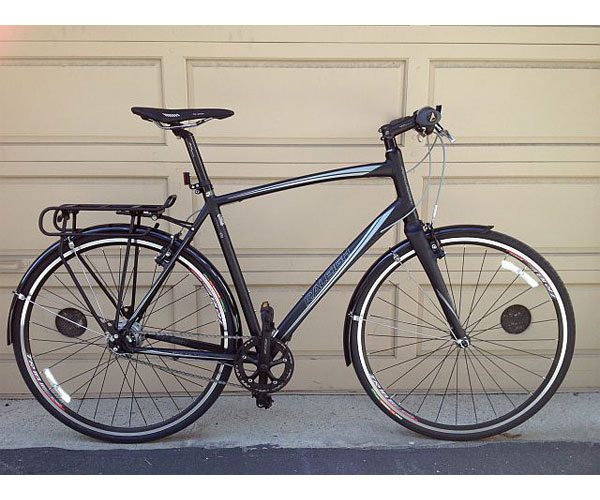Old Bike-New Bike-Last Bike
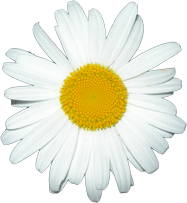
I 'm not exactly sure why, but I've never owned a car. Maybe it's because I like horses, and riding bicycles and motorcycles comes closer to replicating horse-riding. Be that as it may, I got my first motorcycle at age 16, when I lived in Japan. It was an old Miyapet, made by Miyata, which is now better known as a bicycle manufacturer. It was second hand, and only 50cc, which means that it was tiny and had almost no power and barely ran, but it was a lot of fun, and it helped get me out of a bit of a funk at the time. My father helped me take it apart and repair it, and it broadened the scope of my life in Tokyo and helped me make some new friends. A year or so later I got an old Honda 125cc bike, the model of which I forget. It was heavy, built like an armoured tank, and made for deliveries in Japan. I stripped it and roared around on it until I had my first and only catastrophic crash and hospitalization (don't ever do anything stupid on a bike). After that, in Santa Barbara, California, I had a Honda 350, then, in Tokyo again, a Bridgestone 90cc, then in Los Angeles, a Honda 450, and in Tokyo again a 750. For about a decade in the '80s, in San Francisco, I didn't have a motorcycle, but I used to occasionally buy and ship old bikes to Tokyo for Shinji Sakamoto, a friend there. He had a motorcycle shop and would fix them and sell them to collectors. During Japan's "bubble" years, many old Triumphs, BMWs, etc., etc., were very sought after among bike fans. These types of bikes tend to follow the excess money around the world, so they are probably in Shanghai or Dubai now. I never owned them, but often test drove them. Sometimes, my friend would even ask me to locate classic Japanese bikes, such as the Kawasaki Z1 and KZ1000, which were also in demand in Japan.
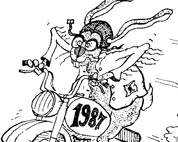
A lot of people ask me why I ride motorcycles, and look at me as if I am crazy to do so. I completely understand their concerns. They are dangerous. I never recommend bikes to anyone who has never logged a lot of time as a kid doing activities that require a lot of balancing, such as surfing, skateboarding, skiing, that sort of thing. I have no statistics to back it up, but I suspect that a lot of bike fatalities are caused not just by hormone-fueled young people, but older men with the financial means but dulled reflexes, who want to relive their youth, and buy big heavy motorcycles they probably shouldn't be riding.
I personally don't ride motorcycles for recreation. I use them for transportation, to get from point "A" to point "B." It's the same way I ride bicycles. I guess you could say it's part of my living-lightly-on-the-earth strategy. When electric motorcycles become a bit more practical, I would love to get one. In the San Francisco Bay Area, motorcycles, scooters, and bicycles are a great way to get around, because parking and traffic are unbearable in a car; I don't think I would be able to live and work in this area without them.
M any people ask me if I "split lanes." The answer is yes, but very carefully. For those not in the know, California is one of the few (perhaps the only) state that allows motorcycles to go between car lanes during traffic jams, as long as they adhere to certain rules. Car drivers hate this, especially on the bridges, as it makes them terrified. Some hot-shot idiot motorcyclists do abuse this rule by speeding, but for car drivers, I think a little wake-up is not always a bad thing, frankly, as far too many of them are texting, flossing their teeth, etc., while driving. If bothered by lane-splitting, here's a tip: bikes usually split along the dotted line between the 1st and 2nd, or far left, lanes on freeways and bridges, so it's easy to avoid them. It's also a little known fact that splitting lanes has safety advantages for motorcycles, and keeps the fatality rate down quite a bit if done correctly.
S ome general rules of thumb I adhere to when driving include never trusting any cars around me, never assuming I have the right of way for anything, never going too fast, never owning a motorcycle heavier than 500lbs, adhering to the ATGATT rule (All The Gear, All The Time),and keeping my focus completely on the road and traffic around me (no music, no texting, no talking to a passenger, etc., etc.). Motorcycles require something in rather short supply in society today: extreme focus and constant, careful, risk assessment. When I drive a car, it drives my wife crazy because I tend to slow down at all intersections and go too cautiously. I often find my self distracted in a car, and believe it or not I actually feel safer on two wheels. Having said that, however, when I'm not pressed for time, I prefer my bicycle over my motorbike, and my absolute favorite form of transportation remains walking!
© 2015 Frederik L. Schodt
San Francisco, California.
2024 Addendum
O n November 12, 2019, I was hit by a car on Interstate 880, in the evening, near Fremont. Driving in the second lane over from the fast lane, I was knocked into the center of the freeway by a car to my left, and only saved by the fact that a kind young woman driving behind me deliberately stopped her car and shielded me from oncoming traffic. With another good samaritan who stopped, I was somehow able to right the motorcycle, and push it through traffic to the side of the road, but I was in a great deal of pain. The police and an ambulance came, and took me to the hospital, where I was found to have multiple fractured ribs and a broken collarbone. I may have passed out briefly while waiting for the ambulance, but I am very grateful for the help that I was rendered. I am also lucky that I was heavily armored with expensive helmet, gloves, padded pants, heavy armored jacket, and other acoutrements. It's called the ATGATT strategy (All the Gear All The Time), and highly recommended. The motorcycle itself had very little damage. I had always wondered how one knows when it is time to stop doing something intrinsically dangerous (like piloting planes, or doing high wire trapeze acts). Having also been hospitalized at eighteen for a motorcycle accident in Japan, I knew that at my age it was now time to stop. I sold my bike and retired from driving it (but I still miss it!). A year and a half later, I had another accident on a bicycle when I hit a pothole in Oakland, California (a town notorious for its potholes). My injuries were even more serious than with my motorcycle accident. While I still ride my bicycle occasionally, I am very careful and my favorite mode of transportation now is definitely walking!
